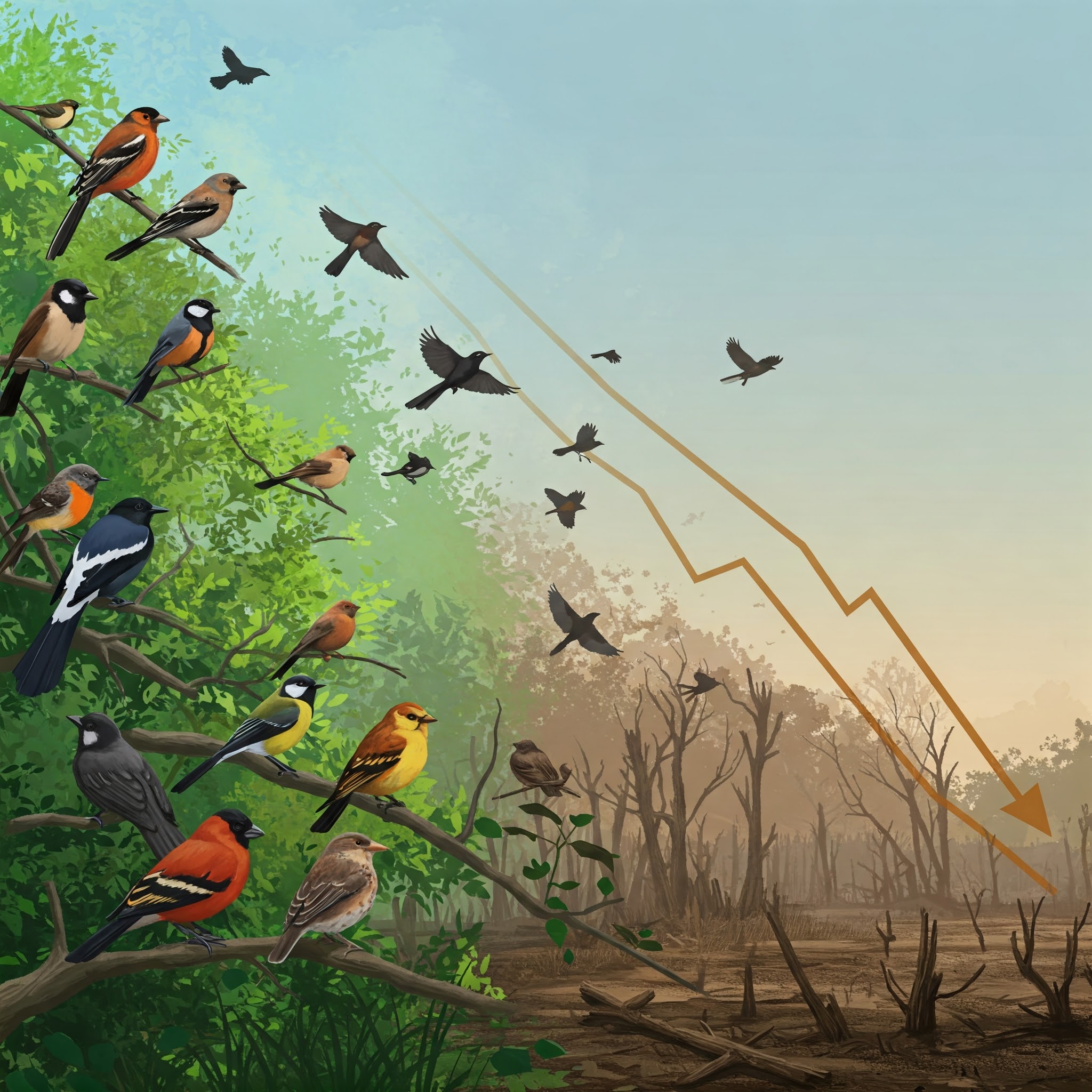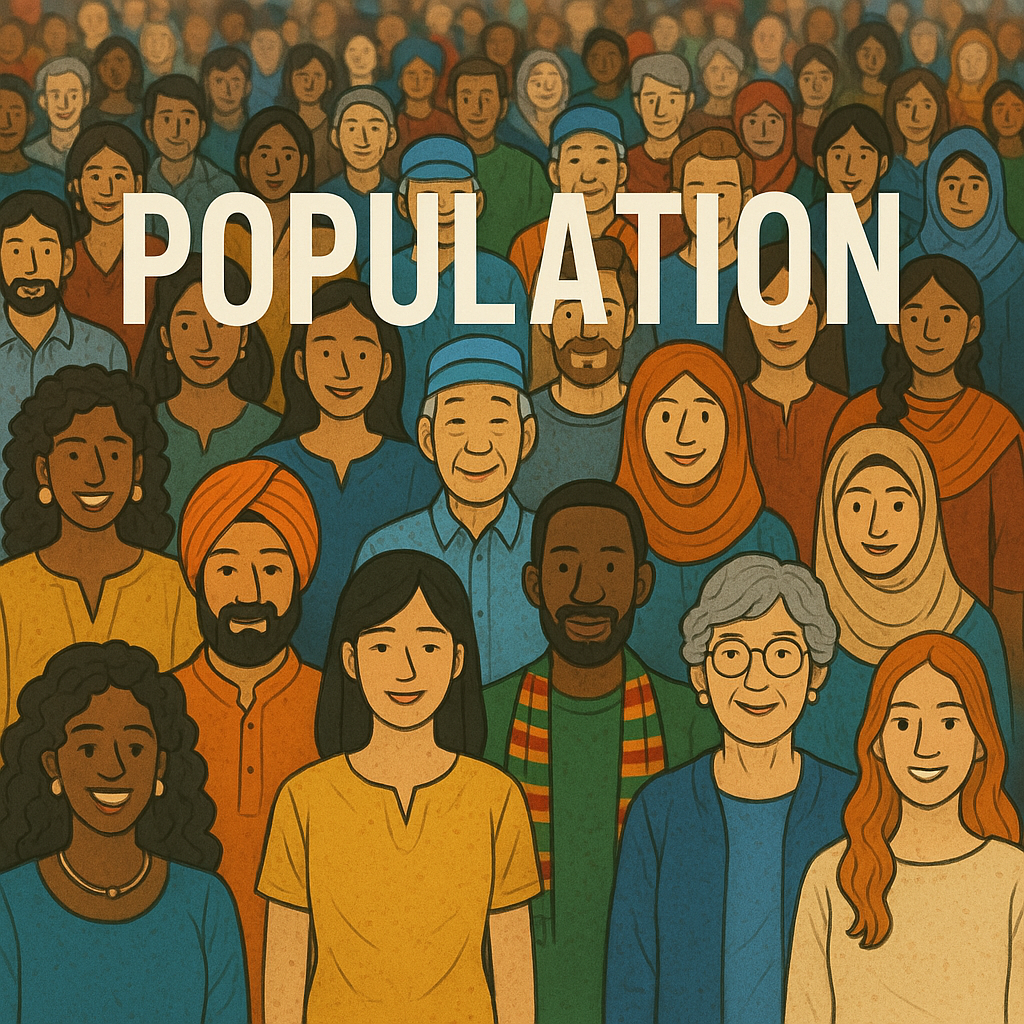Population
Definition
The term "population" describes the total number of people, animals, or organisms living in a specific area or environment.
Parts of Speech
- Noun
Pronunciation
American English
- IPA Pronunciation: /ˌpɑː.pjəˈleɪ.ʃən/
- Respelling: POP-yuh-LAY-shun
British English
- IPA Pronunciation: /ˌpɒp.jʊˈleɪ.ʃən/
- Respelling: POP-yuh-LAY-shun
Etymology
The word "population" originates from the Latin "populatio," meaning "a people or multitude," derived from "populus," meaning "people." It entered Middle English via Old French "population."
Derivatives
- Populous (adjective)
- Overpopulation (noun)
- Depopulation (noun)
- Population density (noun)
- Population control (noun)
Synonyms
- Inhabitants
- Demographics
- Community
Antonyms
- None
Usage
The term "population" is used in fields like demography, ecology, and sociology to study the number and characteristics of groups. For example, "The city’s population has grown significantly in the past decade" or "Scientists are monitoring the wolf population in the region."
Related Terms
- Demography: The statistical study of populations.
- Ecology: The study of organisms and their environments.
- Census: An official count of a population.
Detailed Definitions
Noun
- The total number of people in an area: Refers to the number of individuals inhabiting a city, country, or region.
- Example: "The population of the town is approximately 50,000."
- A group of organisms of the same species: Refers to a population in ecological terms.
- Example: "The bird population has declined due to habitat loss."
- The inhabitants of a place collectively: Refers to all people living in a given area.
- Example: "The country’s population is known for its cultural diversity."
population



🇨🇳 Mandarin
- 人口 (rénkǒu) - The whole number of people or inhabitants in a country or region
- IPA: /ʐən˥˩ kʰoʊ̯˥˧/
- Respelling: rern-kou
- 居民 (jūmín) - A particular group of people living in a specific area
- IPA: /tɕy˥ mǐn/
- Respelling: jyoo-min
🇮🇳 Hindi
- जनसंख्या (jansankhya) - The whole number of people or inhabitants in a country or region
- IPA: /dʒən səŋkʰjaː/
- Respelling: jan-sankh-ya
- निवासी (nivasi) - A particular group of people living in a specific area
- IPA: /nɪvaːsiː/
- Respelling: ni-va-see
🇪🇸 Spanish
- Población - The whole number of people or inhabitants in a country or region
- IPA: /poblaˈθjon/
- Respelling: pob-la-see-on
- Comunidad - A particular group of people living in a specific area
- IPA: /komuniˈðað/
- Respelling: ko-mu-nee-dath
🇫🇷 French
- Population - The whole number of people or inhabitants in a country or region
- IPA: /pɔpɥlɑsjɔ̃/
- Respelling: po-pu-la-see-on
- Communauté - A particular group of people living in a specific area
- IPA: /kɔmynote/
- Respelling: ko-mu-no-te
🇸🇦 Modern Standard Arabic
- السكان (Al-Sukkan) - The whole number of people or inhabitants in a country or region
- IPA: /æl sukaːn/
- Respelling: al su-kan
- مجتمع (Mujtama') - A particular group of people living in a specific area
- IPA: /mʊd͡ʒtæmæʕ/
- Respelling: muj-ta-ma
🇧🇩 Bengali
- জনসংখ্যা (jônsôngkhya) - The whole number of people or inhabitants in a country or region
- IPA: /dʒɔnsɔŋkhja/
- Respelling: jon-song-khya
- সম্প্রদায় (sômprôdae) - A particular group of people living in a specific area
- IPA: /ʃɔmprɔdaj/
- Respelling: shom-pro-day
🇷🇺 Russian
- Население (Naselenie) - The whole number of people or inhabitants in a country or region
- IPA: /nɐsʲɪˈlʲenʲɪje/
- Respelling: na-see-lye-nee-ye
- Община (Obschina) - A particular group of people living in a specific area
- IPA: /ˈopɕːɪnə/
- Respelling: op-shchi-na
🇵🇹 Portuguese
- População - The whole number of people or inhabitants in a country or region
- IPA: /pɔpuˈɫɐsɐ̃w/
- Respelling: po-pu-la-saum
- Comunidade - A particular group of people living in a specific area
- IPA: /kõmuniˈðaðɨ/
- Respelling: kom-mu-nee-da-de
🇮🇩 Indonesian
- Populasi - The whole number of people or inhabitants in a country or region
- IPA: /populasi/
- Respelling: pop-u-la-see
- Komunitas - A particular group of people living in a specific area
- IPA: /komunitas/
- Respelling: ko-mu-ni-tas
🇩🇪 German
- Bevölkerung - The whole number of people or inhabitants in a country or region
- IPA: /bəˈfœlkərʊŋ/
- Respelling: be-folk-er-ung
- Gemeinschaft - A particular group of people living in a specific area
- IPA: /ɡəˈmaɪnʃaft/
- Respelling: ge-main-shaft
🇯🇵 Japanese
- 人口 (Jinkō) - The whole number of people or inhabitants in a country or region
- IPA: /dʑĩŋkoː/
- Respelling: jing-ko
- コミュニティ (Komyuniti) - A particular group of people living in a specific area
- IPA: /ko.mjɯ̟ᵝ.ni.ti/
- Respelling: ko-myuni-ti
🇻🇳 Vietnamese
- Dân số - The whole number of people or inhabitants in a country or region
- IPA: /jɛn ʂɔ˧ˀ˦/
- Respelling: dan so
- Cộng đồng - A particular group of people living in a specific area
- IPA: /kəːŋ ŋ͡m˧˩˨ ʈoŋ˧ˀ˦/
- Respelling: kong dong
🇰🇷 Korean
- 인구 (In-gu) - The whole number of people or inhabitants in a country or region
- IPA: /inɡu/
- Respelling: in-gu
- 커뮤니티 (Keomyuniti) - A particular group of people living in a specific area
- IPA: /kʰʌmjunithi/
- Respelling: keo-myu-ni-ti
🇹🇷 Turkish
- Nüfus - The whole number of people or inhabitants in a country or region
- IPA: /nyfys/
- Respelling: nu-fus
- Topluluk - A particular group of people living in a specific area
- IPA: /topluluk/
- Respelling: to-plu-luk
🇵🇰 Urdu
- آبادی (Aabadi) - The whole number of people or inhabitants in a country or region
- IPA: /ɑːbɑːdiː/
- Respelling: aa-baa-dee
- کمیونٹی (Komyuniti) - A particular group of people living in a specific area
- IPA: /kɔːmjʊˈniːt̪iː/
- Respelling: ko-myu-ni-tee





